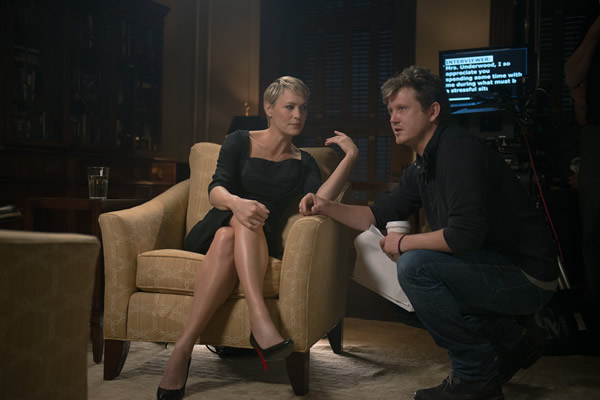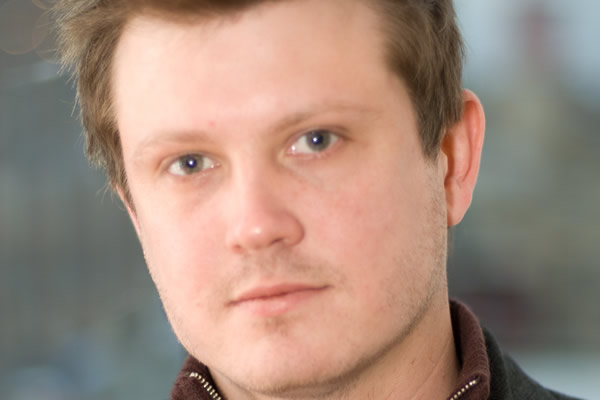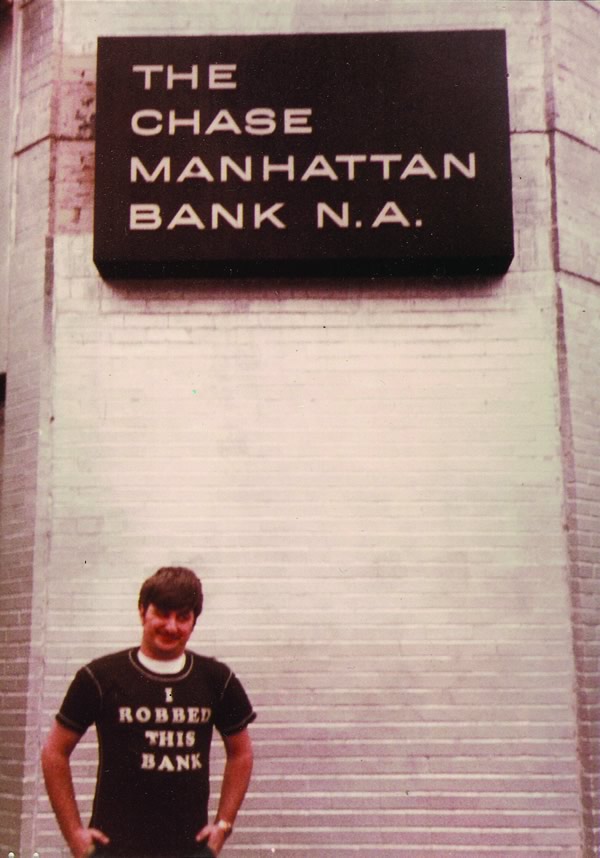‘Card’ tricks

Beau Willimon on the set of ‘House of Cards’ with actress Robin Wright. (Photo courtesy Netflix)
‘An Evening With Beau Willimon’
Smithsonian Associates
A discussion with David Carr of the New York Times
National Museum of Natural History
10th and Constitution, N.W.
$30 ($25 for Associates members)
Thursday at 6:45 p.m.
smithsonianassociates.org
Beau Willimon, the creator/writer/executive producer behind the hit Netflix series “House of Cards” will be in Washington — the show’s setting — next week for an appearance with the New York Times’ David Carr at the Smithsonian National Museum of Natural History.
On location in Baltimore where he and the crew are gearing up to film the third season, Willimon took a few minutes to talk about his characters, how far ahead he plans the show and why issues like sexual orientation probably don’t cross the minds of his lead characters, President Francis “Frank” Underwood (Kevin Spacey) and First Lady Claire Underwood (Robin Wright). His comments have been slightly edited for length.
WASHINGTON BLADE: You’ve said before the show (entire seasons of which are delivered at one time) works equally as well if somebody wants to “binge watch” or watch an episode at a time. Watching old serials like “Dallas” or “Dynasty” now on DVD, it’s so obvious the producers got a lot of mileage out of making the audience squirm and wait. What impact does the removal of that factor have on the show?
BEAU WILLIMON: The times they are a changing, for sure. But this began quite some time ago. As soon as box sets, DVR and On Demand came out, people began experiencing shows in binge-like fashion even if that term hadn’t yet been coined. I remember watching several seasons of “The Sopranos” and “Deadwood” like that. Even shows that were released week to week, a lot of people like myself and others experienced them several seasons at a time or you might watch a whole season over the course of days instead of weeks. I think those shows absolutely work if you watch them on a binge and Netflix has given people an opportunity to choose for themselves. There’s no requirement to watch them in a binge and a lot of people don’t. It’s just putting the experience in the hand of the viewer from day one.
BLADE: But does the fact that that’s even a possibility affect your pacing?
WILLIMON: No, because it has to be able to work both ways. A good story is a good story. We always thought of the first season as a 13-hour movie more than anything else. We had specific episodes that had a beginning, middle and end, but it’s really more like chapters of a book. If you’re reading a book, nobody tells you how much you should read in any given sitting. So we took that approach and I think it works.
BLADE: How has D.C. been to work with when you need establishing shots and that sort of thing?
WILLIMON: Great. Everyone in the film and television commission in Washington goes out of their way to help us out. There are a lot of security restrictions and rightly so since 9-11. It’s not as easy to film in D.C. as it may have been 20 years ago, but that’s the world we live in.
BLADE: “Mad Men” creator Matthew Weiner told Rolling Stone recently that he had a 10-minute conversation with Jon Hamm before they started shooting and told him the whole story of Don Draper, how it ends and everything. I’m not asking for specifics, but do you have “House of Cards” that planned out? Do you know how it ends?
WILLIMON: I don’t know if the conversation between Jon and Matthew encapsulated the entire series. Maybe it did. If that’s the case, Matthew had a very grand vision in mind. I always knew where the second season would end and I knew a lot of the big things that would happen along the way. I had conversations with Kevin and Robin and a number of the cast about where their characters were heading and the general direction of the story and where they would end up by the end of season two. I think it’s a good idea to give the actors as much information as possible. And I often made changes to the story based on what I was seeing in front of the camera and due to the fact that sometimes better ideas bubble forth in your head midway through the season. I also rely a lot on the discussions I have with the actors who, at a certain point, start to know the characters as well as the writer does. That dialogue feeds into the scripts we’re working on. Makes them richer, deeper, more complex. So I encourage that sort of collaboration.
BLADE: What would be an ideal number of seasons for you?
WILLIMON: I’m just tackling one season at a time. We’re at a day and age in television where people have come to expect a satisfying conclusion to a series and we definitely will aim for that with “House of Cards.” But as to the exact number of seasons, I don’t know yet.
BLADE: If backed into a corner, do you think Frank or Claire might push each other under the bus? They have an interesting marriage but it seems like self-preservation might trump all.
WILLIMON: You’re very sneaky in trying to get me to talk about upcoming seasons (laughs). One of the first things I established was that I wanted the show to be about marriage as much as anything else. Their marriage is certainly very unconventional. It doesn’t abide by a lot of the rules that a more traditional marriage does, but it works for them and they make each other stronger in the process. They do have their conflicts and they rub each other the wrong way and sometimes they’re a liability to each other, but so far they’ve always found a way around that and come out stronger in the process. As to how it will evolve, there’s only one way to find out.
BLADE: Their three-way with Meechum has generated a lot of fan discussion. What kind of dramatic purpose did it serve that they had a three-way with a man as opposed to a woman?
WILLIMON: Well yeah, sure. I think we should go back to the episode in season one where Frank says it best — I’m paraphrasing — but he essentially says that when he’s attracted to someone or something, he goes for it. He has a large appetite and he isn’t one to traffic in labels. He finds them limiting. A lot of people have asked me if Francis is gay, is he bi, is he pansexual? Is he any number of terms? And I don’t think Francis himself would have much patience for that conversation. His appetite is vast and we see him in all sorts of relationships. Some are purely transactional, some are based on love and respect as his marriage proves, and others are somewhere in between. In terms of the threesome between Claire, Francis and Meechum, what we were going after there was seeing a side of Francis and Claire that we don’t often get to see. They are human begins after all. They have desires and whims just like anyone else and they aren’t just always pure political calculations. Sometimes they have a few drinks and the circumstances might align in a way that the impulses take over. … I don’t think they’d ever be sloppy about it, but because they feel safe with him, that opens up possibilities. And one of the things I’m most proud of is that they don’t make much of a big deal out of it. The next day it’s back to business as usual. … That night was different than other nights, but it doesn’t mean the world was turned upside down and that’s fine. If we had made a big deal out of it, I think it would have been untrue to their characters and trying to place an accent on a syllable that didn’t deserve it.
BLADE: Are you straight?
WILLIMON: Yes. I mean if you’re going to use labels, I guess I would identify as straight.
BLADE: I’m intrigued that with all the technology available, you block out seasons with grids on dry erase boards. That’s so wonderfully old school.
WILLIMON: Well, we use Google docs and stuff like that too, but there’s still something to be said for having a big board in front of everyone on a wall where we can all see it. Throw something up, erase it. I guess you could do that with some sort of massive touch screen, but we do just fine with a dry erase board, some markers and a cork board with index cards. It all ends up in our Google docs and digital formats at some point.
BLADE: Tell us a little about the documentary you’re planning on Westerly Windina, the transgender Australian woman formerly known as pro surfer Peter Drouyn.
WILLIMON: I have a small production company called Westwood Productions with my producing partner, Jordan Tappis. He was a former pro world surfer so he’s very looped into the surfing community. He’s tight with a journalist named Jamie Brisick who has been writing about surfing for years. And Jamie got wind of Westerly’s story. Peter Drouyn was a hero to so many in surfing in the ‘60s and ‘70s, a true iconoclast. … He sort of fell off the face of the earth and Jamie wondered whatever happened to Peter Drouyn. And what he discovered was that Peter had fully realized herself as Westerly Windina and, of course, his curiosity took over. He began to interview her, to write about her and they eventually wrote a book. He approached Jordan and said, “I think we should do a documentary.” … It’s been quite a journey. Since we began filming, she did her operation and is fully a woman now physically. And the journey continues.
BLADE: With President Obama — and no disrespect meant to his work ethic or what he’s accomplished — but it felt to me like there was an inevitability to his presidency. That the planets had aligned in such a way for that to happen exactly when it did. Frank and Claire on “House of Cards” operate with an m.o. that for them to rise, others must go down. Is that an ethos you think works in the real world?
WILLIMON: Yes and no. Frank and Claire are an extreme version of power in Washington. They have no discernible ideology. Maybe Claire does on some issues a bit more than Frank does, but at the end of the day, they’re pursuing power for powers’ sake. I think most people who get into politics get into it for the right reasons. They want to serve their country, they want to make the world a better place. And yet the higher up the ladder you get and the more power you yield, you’re faced with all sorts of ethical choices and you have to make compromises for the sake of political expediency that might contradict deeply held beliefs. These ethical choices and contradictions erode your beliefs. In Francis and Claire, we have people who believe they’ve liberated themselves from such beliefs. They see ideology as quicksand that gives you no opportunity to navigate, to be flexible, to adapt. To a certain degree, I think that makes political sense. When you see, whether it’s the far right or the far left, people who are completely intransigent, then all you get is gridlock. The nature of politics is compromise.

Beau Willimon is slated for an appearance next week at the Museum of Natural History. (Photo courtesy PMK-BNC)
Joey DiGuglielmo
‘Card’ tricks



 Hallmark’s doing a lovely job of celebrating Pride Month: in addition to releasing some cute rainbowy animations, they just put out
Hallmark’s doing a lovely job of celebrating Pride Month: in addition to releasing some cute rainbowy animations, they just put out 